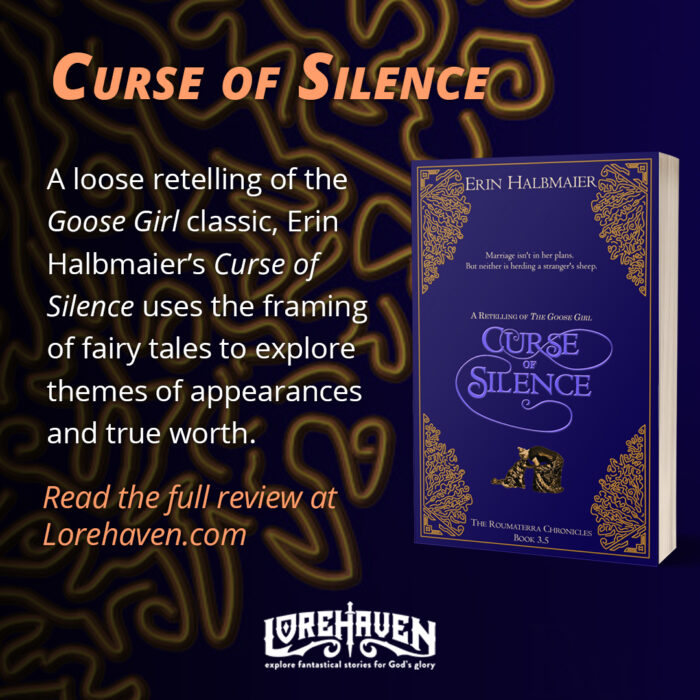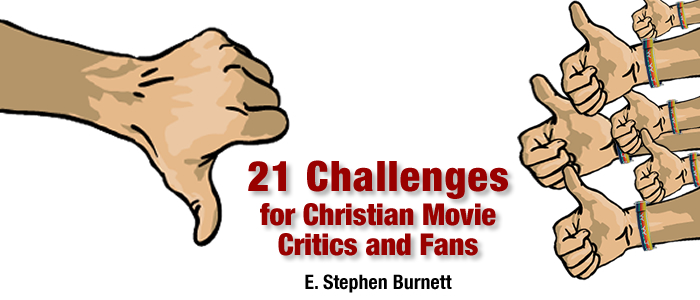Seven Final Challenges For Christian Movie Critics and Fans
What are movies—including but not limited to Christian-made movies—meant to do?
If Christian movies are like Christian sermons, how should they play by sermon rules?
Do these films actually challenge people? Help people convert? Have any timeless appeal?
Those questions are from the first episode and second episode of the 21 Challenges for Christian Movie Critics and Fans. Here’s the final episode, and this time I will risk beginning to offer some answers to my own questions. My thanks to readers for their sharpening me.
15. Critics: Are we being sensitive to fans’ movie-criticism stigmas?
If you’re familiar with “content warnings” or “trigger warnings,” among either evangelicals or progressivists, you may be tempted to laugh or shrug this off. Sometimes I feel the same. But the apostle Paul warns1 against doing something that is causing weaker brothers to stumble.2
In this case, what happens when a Christian movie fan hears a Christian critic blasting it?
I don’t believe the fan would technically stumble per Paul’s warning. That is, the fan would not feel tempted to imitate the criticism of Christian movies but with sinful motives. But the fans could assume certain things about the reason for the critic’s condemnation, such as:
- “That critic must not care how much the Christian movie meant to me personally.”
- “That critic must be a compromiser with Big Hollywood and its anti-Christianity.”
- “That critic doesn’t care about evangelism or other moral values, only worldly Art.”
Is the Christian movie critic responsible for misinterpretations? Not at all. And yet Paul promotes care and love for people who might wrongly assume that your good action is actually evil. He says, “Do not let what you regard as good be spoken of as evil.”3 I’m often re-learning this truth. If I’m going to go out challenging or critiquing a Christian movie, I need to be sensitive to and respond to what fans will assume.
16. Fans: Are we being sensitive to critics’ evangelical-culture stigmas?
 You may love Christian movies and think they’re not only amazing, but a great way to reach people who would not otherwise listen to Christians or visit a church. If so, have you also considered whether the actual nonbelievers you know feel the same way about the movies?
You may love Christian movies and think they’re not only amazing, but a great way to reach people who would not otherwise listen to Christians or visit a church. If so, have you also considered whether the actual nonbelievers you know feel the same way about the movies?
Some people instead have stigmas about evangelical culture such as Christian movies, or even music or Thomas Kinkade paintings. Some non-Christians—especially if they grew up in certain evangelical backgrounds—react to evangelical culture in the same way Christians (rightly) react to blasphemy or TV nudity. A non-Christian sees an evangelical-culture thing and assumes, “I gave that up when I was a child. That’s not worth my time.”4
At Christ and Pop Culture, Alan Noble puts it this way:
If we choose to embrace the Christian culture that is marketed to us, we run the risk of giving nonbelievers and new believers the impression that this culture is essential to the faith, that part of what it means to be a Christian is to accept a set of cultural tastes and interests. Even if we have the freedom to decorate our home with porcelain figures from the local Christian bookstore, to exclusively let our children watch Veggie Tales, and to listen to the Christian radio station, if these cultural choices come to define us as a community, then we can very easily present a false image of the faith. If we are more easily identified by our particular taste in movies than our love for each other, or if these become inseparable, then we have conflated the Gospel and the community of the Church with the social phenomenon that is Christianity.5
If non-Christians have such stigmas about Christian movies, then we need to rethink the reasons we like these movies (the challenge of question 2 in episode 1). At least, we must avoid saying things like, “Christian movies can reach unbelievers with biblical truth.”
17. Critics: Are we acting like anti-pop-culture evangelicals?
Once upon a time, most of the big movies were made by Big Hollywood. Evangelicals would see them sometimes, but usually condemn everything wrong with Big Hollywood.
And the evangelicals would not actually try to make any of the big movies themselves.
Today, some of the (relatively) big movies are made by Christians. Other Christians see them sometimes, but usually condemn everything wrong with the Christian movie-makers.
And most Christian movie critics do not actually try to make the big movies themselves.
So—are critics incidentally turning into little but a complaining counter-culture? Are they vulnerable to the charge of, “I like my way of doing it better than your way of not doing it”?

This challenge is partly untrue. Some Christians are trying to make their own films that are not typical family-friendly “Christian movies.” I’ve heard of examples, including a few independent Christian-made movies that acknowledge their limitations and try to value not only truth but excellent production value. But for whatever reason, these movies have not taken off like a War Room or a God’s Not Dead.
Like it or not, there’s a bigger audience for those popular movies than there is for, say, a Christian-made indie art-house drama.
Christian critics of poorly made, sentimental-story Christian films need to show, not just tell. And some need to make better films that appeal the popular level. Like how Jesus did.
18. Critics: Do we recognize the limits of Christian art and filmmaking?
Some critics who say we need better, deeper, hotter, expensive, more-biblical Christian movies need to be told just one little shutdown phrase: “Okay, that will be $70 million.”6
But what Christians need first may be even more expensive:
- A popular-level spread of biblical, gospel-based reasons to value popular culture.
- Christian teachers who publicly endorse popular-level yet excellent culture-making.
- Christian investors who finance organizations that grow culture-making talent and eventually finance high-profile movie productions. These productions could only be done in response to the newly made audience’s natural desire for more challenging, fun films that make use of their faith’s prize natural resources (more on this below).
19. Critics: Do we think that ‘basically add more swear words’ is a fix?
 Imagine a movie in which an angry politician, exasperated business leader, or desperate action hero lets loose with an F-bomb. Depending on the context this can be offensive, understandable, or even seemingly “required.”
Imagine a movie in which an angry politician, exasperated business leader, or desperate action hero lets loose with an F-bomb. Depending on the context this can be offensive, understandable, or even seemingly “required.”
Now, imagine a Christian movie in which a wholesome Christian character depresses the verbal detonator. It won’t come across as anything other than awkward or even hilarious.
In fact, I’ve read some “edgy” Christian fiction in which it’s obvious the author is playing with verbal matches. I can almost see the gleeful “Hee hee, I lit up a word and set the page on fire” grin on their faces. Or in a better context, you can see the author just awkwardly try out the Bad Words in a story context that does not even lend itself to the swear.
Like it or not, cussing isn’t most evangelicals’ native language. You may argue that it should be. Here I’m ducking that issue. What I say is that “wholesomeness” critics who awkwardly force such “edginess” often look just as silly as the folks who enforce “wholesomeness.”
20. Critics: Are our ‘Christian movie reviews’ really our reviews of fans?
Careful Christian reviewers avoid confusing movies and fans. But anecdotally I spy this impulse in myself and in other critics of sentimental and poorly made Christian movies.
For example, some negative War Room reviews say things like “This idea could lead naïve Christians to believe that …” or, “This part of the story could imply that …” And this is a bad movie-review hermeneutic. This does not engage the movie on its own terms. This does not keep the movie itself separate from the fans we’re picturing in our heads—an imaginary crowd of evangelical magpies who snatch anything spiritually shiny without discernment.
Yes, these folks do exist. But they should not make cameo appearances in movie reviews. Anyway, lambasting them or their movies is not the way to challenge the problem.
21. Fans: Can’t Christian movies more deeply mine the height and width and breadth and depth of our faith’s natural resources?
However, I must admit this: Most Christian movies emphasize overtly “spiritual” things, especially the moment of salvation. This frustrates me. Not because I think the theme of salvation is boring, or so “mysterious” as to be meaningless, or cliché, or “unartistic.”
Instead I’m frustrated because the approach is almost always so limited.
Christian movies often act as if conversion (or re-dedication) is first a theatrical moment or a decision point, rather than a miraculous—yet quickly quantifiable—life transformation.
Or as if the whole story must be about the conversion rather than what happens afterward.
The closest genre equivalent is the romance or romantic comedy in which the story does not start with an already-married couple but a pair of singles who, after ensuing hijinks, Learn to Love Again. I don’t oppose this. I love these stories. But I also love other stories—especially fantastical ones.
Now imagine a theater full only of singles-find-love stories.
Is that what Christians want to be known for? As if Christianity is only about conversion or overt re-dedication events? What happens after salvation? I mean, what do we do in real life other than try to get other people saved, or Rededications, or Family Values?
I suspect many Christians think these are our best and thus most story-suitable qualities. Only when we explore the universe-rebuilding aspects of the gospel will we reconsider this.
Think like a pragmatist marketer who gets the raw materials of the Christian religion.
No, not the audience. Not the people in churches. The faith itself.
Imagine you’re a movie producer/writer. Lock yourself in a room with just the Bible and some of the classic works of theology written about it. Now write a movie story proposal.
Too much to start with? Then start the way pretty much every movie producer seems to be starting: Pre-existing name recognition from before the D.S.E (Smartphone Distraction Era).7 What do most people assume or know accurately about Christianity?
Too deep? Keep the theme popular but also deep. The best movies do both. How about:
Theodicy. As a recent conversation confirms, people hate/love exploring the issue of why an omnipotent God allows sin, and suffering. This is prime popular-Christian-movie material, especially if you honestly end with some questions unanswered.
Parables. Some Christian movies are adaptations of Jesus’s popular parables, yet with at best mixed results. This may be because they imagine a parable’s purpose is “to teach a moral” or “to convert the hearer.” But “to reveal a truth about the Kingdom of Heaven that takes some digging to understand” is closer to Jesus’s purpose in telling parables.
Epics. Christians, we keep forgetting we started the fantastical story genre. All of Western culture has been based on a Judeo-Christian worldview that includes God and creation and miracles and providence and redemption plus the true-myth version of the Hero’s Journey that has been a crux of stories for centuries. There is no reason to abandon this depth of our faith and leave it to be explored by secular filmmakers. We know the Hero of the Hero’s Journey. We may not have millions, but we have this creative “edge.” Why not mine the riches of our faith about Him and use those riches to finance our cinematic creativity?
- Romans 14, 1 Corinthians 8. ↩
- Note the wording: something that is causing. Paul is speaking about specific situations in which Christian A does a thing without sinful motive that makes Christian B want to do the same thing with a sinful motive. Paul is not telling all Christian As to preemptively avoid offending any potential Christian Bs out there. ↩
- Romans 14:16. ↩
- And in today’s culture, with moralistic judgments based on progressivistic religion, non-Christians seeing evangelical culture increasingly think not only “That’s worthless” but “that’s evil.” ↩
- Rethinking the Stumbling Block: Christian Culture as a Barrier, Alan Noble at Christ and Pop Culture, Aug. 27, 2009 (emphasis added). ↩
- Or try this shutdown paragraph: “Okay, great. But while I’m spending all the time being a starving artist or cultivating my filmmaking skills, who will help me eat? You see, a non-Christian may be able to get a lousy loft apartment in a downtown metropolis. But Christians ought to first obey God’s command to provide for their families—and yes, most Christians also have families. Their health comes before my rags-to-riches artist story.” ↩
- This is why we getting movies based on board games and Pez dispensers—name recognition alone. ↩







































This section really, really intrigues me. Especially 19 and the related image. I’ve generally approached it from the opposite side when watching secular things (‘Mom, Coulson is a senior government whose agency has been taken over by an enemy he thought dead for 70 years. Is he honestly gonna stick to ‘Oh shoot’?) but from the other side, it’s also got some power.
Think about whether the character would say it, not whether or not the author’s allowed to use it, and a lot of the fuss would die down.
Would somebody explain to me how War Room has enough appeal to be this financially successful?
Also, why isn’t the summary Judeo-Christian spells to magically fix your spouse. No adult skills like problem-solving and effective communication needed!
Think of Tyler Perry and his Madea movies. They both target an underserved demographic. In Perry’s case, it’s the chitlin circuit of older southern blacks. In Kendricks, it’s devout fundamentalist Christians. Both groups tend to be invisible on screen, and both filmmakers show things that matter to their life.
It’s appealing because it isn’t magic spells. To a person who believes it, it’s the idea that God answers prayer, and prayer has the potential to change lives. There’s an odd thing with non-fundamentalist Christianity where they think it’s good to pray, but not effectual-you do it not so much to receive a result, but to submit to whatever God has already decided. War Room is sort of a wish-fulfillment, that the prayers you pray will be answered and are effectual to change lives.
Further thinking has me decided that it’s like the socio-emotional version of prosperity gospel, and I don’t understand why that’s popular, either, except I know that magical thinking exists.
D.M. is right. Biblical Christians absolutely believe in prayer, and we do believe God answers prayer with “yes” and that by praying we can help change things–because we are petitioning our loving Creator.
But I also agree that the movie can serve as a kind of wish-fulfillment.
Thing is, that impulse is not unique to Christian movies (or their fans). We’re just supposed to know better when it comes to reality.
Some of the issue with film in particular is that there’s really no substitute for money. War Room does what it does, because it’s really inexpensive to make a marriage-romantic film on a tiny budget. Even the remade Left Behind only had a tenth of the budget of X-Men Days of Future Past, and half of the budget of Twilight, which was considered a very inexpensive film to make.
What is a bit annoying about the Kendricks though is that they really should be spending some of the money they make on better films. Yeah War Room was 3 million, but grossed something like 50 million +. Courageous grossed 15 times its budget. They don’t need to go whole hog, but I’m wondering where all that money goes when their films are shot so cheaply.
I have also been wondering this.
This is why I’ve been altogether supportive of these films making more money. I’ve previously thought, “Well, that’s a great start. Now put that in some kind of fund with interest, and contact some businesspeople to finance and creative people to help make, and let’s make some truly bigger movies.”
But that won’t happen so long as more Christian viewers like what they see and do not see any reason to grow.
According to the preaching I hear, yes, those three things — particularly the first one — truly are all that we should live for. Our lives should explicitly be ordered for the agenda of sharing the gospel, my pastor teaches.
Some of it is semantics and interpretation. The hardcore evangelizers I know don’t dispute the value of living. They just think that every interaction and activity should be done with the intent of “planting seeds” or building toward the opportunity to share the gospel. They acknowledge that they don’t necessarily have to bring out their Bibles and invite people to receive Jesus in every conversation, but I think they imagine that every positive interaction is inherently leading to that end.
I don’t buy it at all, and I want to run away every time people start talking about evangelism that way. Still, I must acknowledge that many of these people have managed to live a holistic, internally peaceful Christian life. I don’t understand how they can live with their convictions without screaming in frustration and despair every day, but I see that some of them do.
Bridging the gap between Christians who think they have to be evangelizing all the time and other Christians is partially a matter of translating the image of a peaceful, holistic, well-attuned life from one “language” to another.
I would describe a well-attuned life as experiencing the death of Christ in daily self-denial while looking at the broken world with the faith that God will bring about its glorious transformation. I suppose the people I know would describe a well-attuned life as being in the center of God’s mission, of fully yielding to God’s personal agenda of seeing the lost come to know Jesus, of being fully willing to do whatever God asks without reservation. I think to bridge the gap between “Christian movie fans” and “Christian movie critics” we would somehow have to show that these different visions of a holy life are compatible, perhaps two different pictures of the same thing.
If they’re not, then do we share the same faith at all?